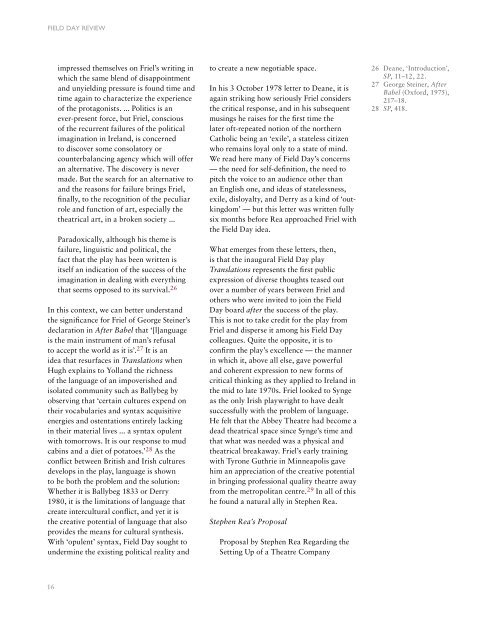cd on translations
cd on translations
cd on translations
Create successful ePaper yourself
Turn your PDF publications into a flip-book with our unique Google optimized e-Paper software.
FIELD DAY REVIEW<br />
impressed themselves <strong>on</strong> Friel’s writing in<br />
which the same blend of disappointment<br />
and unyielding pressure is found time and<br />
time again to characterize the experience<br />
of the protag<strong>on</strong>ists. ... Politics is an<br />
ever-present force, but Friel, c<strong>on</strong>scious<br />
of the recurrent failures of the political<br />
imaginati<strong>on</strong> in Ireland, is c<strong>on</strong>cerned<br />
to discover some c<strong>on</strong>solatory or<br />
counterbalancing agency which will offer<br />
an alternative. The discovery is never<br />
made. But the search for an alternative to<br />
and the reas<strong>on</strong>s for failure brings Friel,<br />
finally, to the recogniti<strong>on</strong> of the peculiar<br />
role and functi<strong>on</strong> of art, especially the<br />
theatrical art, in a broken society ...<br />
Paradoxically, although his theme is<br />
failure, linguistic and political, the<br />
fact that the play has been written is<br />
itself an indicati<strong>on</strong> of the success of the<br />
imaginati<strong>on</strong> in dealing with everything<br />
that seems opposed to its survival. 26<br />
In this c<strong>on</strong>text, we can better understand<br />
the significance for Friel of George Steiner’s<br />
declarati<strong>on</strong> in After Babel that ‘[l]anguage<br />
is the main instrument of man’s refusal<br />
to accept the world as it is’. 27 It is an<br />
idea that resurfaces in Translati<strong>on</strong>s when<br />
Hugh explains to Yolland the richness<br />
of the language of an impoverished and<br />
isolated community such as Ballybeg by<br />
observing that ‘certain cultures expend <strong>on</strong><br />
their vocabularies and syntax acquisitive<br />
energies and ostentati<strong>on</strong>s entirely lacking<br />
in their material lives ... a syntax opulent<br />
with tomorrows. It is our resp<strong>on</strong>se to mud<br />
cabins and a diet of potatoes.’ 28 As the<br />
c<strong>on</strong>flict between British and Irish cultures<br />
develops in the play, language is shown<br />
to be both the problem and the soluti<strong>on</strong>:<br />
Whether it is Ballybeg 1833 or Derry<br />
1980, it is the limitati<strong>on</strong>s of language that<br />
create intercultural c<strong>on</strong>flict, and yet it is<br />
the creative potential of language that also<br />
provides the means for cultural synthesis.<br />
With ‘opulent’ syntax, Field Day sought to<br />
undermine the existing political reality and<br />
16<br />
to create a new negotiable space.<br />
In his 3 October 1978 letter to Deane, it is<br />
again striking how seriously Friel c<strong>on</strong>siders<br />
the critical resp<strong>on</strong>se, and in his subsequent<br />
musings he raises for the first time the<br />
later oft-repeated noti<strong>on</strong> of the northern<br />
Catholic being an ‘exile’, a stateless citizen<br />
who remains loyal <strong>on</strong>ly to a state of mind.<br />
We read here many of Field Day’s c<strong>on</strong>cerns<br />
— the need for self-definiti<strong>on</strong>, the need to<br />
pitch the voice to an audience other than<br />
an English <strong>on</strong>e, and ideas of statelessness,<br />
exile, disloyalty, and Derry as a kind of ‘outkingdom’<br />
— but this letter was written fully<br />
six m<strong>on</strong>ths before Rea approached Friel with<br />
the Field Day idea.<br />
What emerges from these letters, then,<br />
is that the inaugural Field Day play<br />
Translati<strong>on</strong>s represents the first public<br />
expressi<strong>on</strong> of diverse thoughts teased out<br />
over a number of years between Friel and<br />
others who were invited to join the Field<br />
Day board after the success of the play.<br />
This is not to take credit for the play from<br />
Friel and disperse it am<strong>on</strong>g his Field Day<br />
colleagues. Quite the opposite, it is to<br />
c<strong>on</strong>firm the play’s excellence — the manner<br />
in which it, above all else, gave powerful<br />
and coherent expressi<strong>on</strong> to new forms of<br />
critical thinking as they applied to Ireland in<br />
the mid to late 1970s. Friel looked to Synge<br />
as the <strong>on</strong>ly Irish playwright to have dealt<br />
successfully with the problem of language.<br />
He felt that the Abbey Theatre had become a<br />
dead theatrical space since Synge’s time and<br />
that what was needed was a physical and<br />
theatrical breakaway. Friel’s early training<br />
with Tyr<strong>on</strong>e Guthrie in Minneapolis gave<br />
him an appreciati<strong>on</strong> of the creative potential<br />
in bringing professi<strong>on</strong>al quality theatre away<br />
from the metropolitan centre. 29 In all of this<br />
he found a natural ally in Stephen Rea.<br />
Stephen Rea’s Proposal<br />
Proposal by Stephen Rea Regarding the<br />
Setting Up of a Theatre Company<br />
26 Deane, ‘Introducti<strong>on</strong>’,<br />
SP, 11–12, 22.<br />
27 George Steiner, After<br />
Babel (Oxford, 1975),<br />
217–18.<br />
28 SP, 418.


